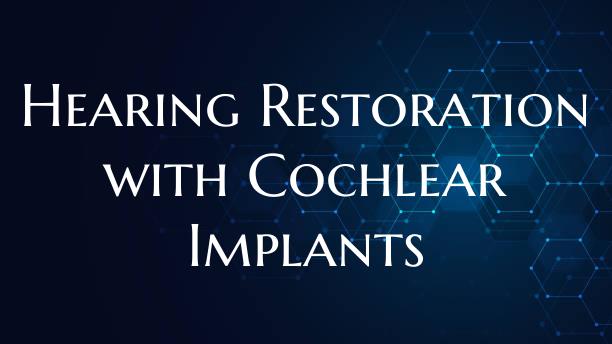
Hearing Restoration with Cochlear Implants
In recent years, cochlear implants have revolutionized the way hearing loss is addressed, offering individuals with severe to profound hearing impairment a chance to experience sound and regain a sense of connection to the world. These remarkable devices have paved the way for hearing restoration in individuals who previously had limited options for improving their auditory function.
What exactly are cochlear implants, and how do they work? Cochlear implants are small electronic devices that are surgically implanted under the skin behind the ear. Unlike hearing aids, which amplify sound, cochlear implants bypass damaged parts of the ear and directly stimulate the auditory nerve. This process allows sound signals to be sent to the brain, where they are interpreted as sound.
The journey to receiving a cochlear implant typically begins with a thorough evaluation by a team of skilled professionals, including audiologists, otolaryngologists, and speech-language pathologists. Candidates for cochlear implantation are often individuals who have moderate to profound hearing loss and have not benefited significantly from traditional hearing aids.
The surgical procedure to implant a cochlear device is generally safe and well-tolerated, with most patients experiencing minimal discomfort during the process. Following surgery, a period of rehabilitation and auditory training is crucial to help the individual adapt to the new way of hearing provided by the implant. This training may involve working with a speech therapist to learn to interpret the new sounds and develop effective communication skills.
One of the most remarkable aspects of cochlear implants is the profound impact they can have on an individual's quality of life. For many recipients, hearing restoration with a cochlear implant opens up a world of previously inaccessible sounds, allowing them to re-engage with conversations, enjoy music, and participate more fully in social activities. The ability to hear and communicate effectively can lead to improved relationships, increased confidence, and enhanced overall well-being.
In conclusion, cochlear implants offer a powerful solution for individuals with severe hearing loss, providing a pathway to experiencing sound and regaining a connection to the world around them. Through advanced technology and comprehensive support from healthcare professionals, hearing restoration with cochlear implants is transforming lives and offering hope for a brighter auditory future.